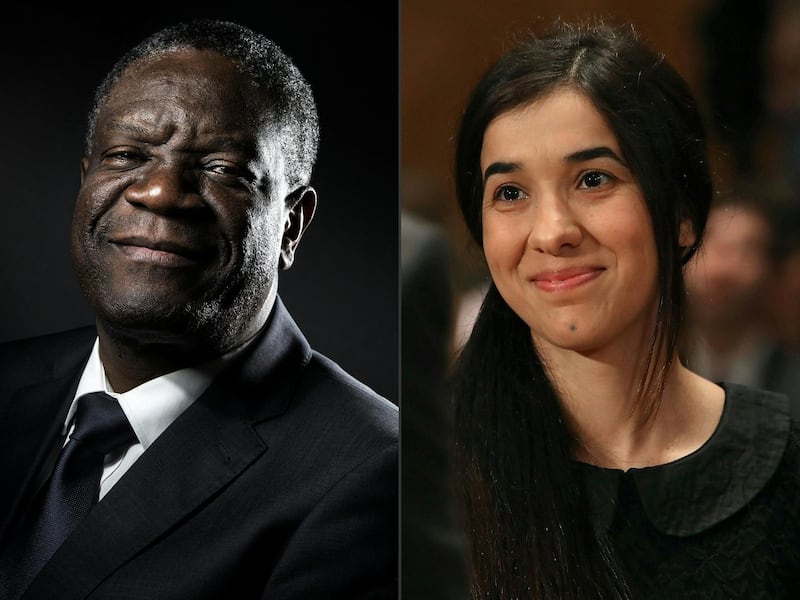The list of Nobel peace prize winners since 1901 is filled with politicians and international institutions. Conspicuously absent until recently have been campaigners and activists – brave individuals without institutional backing and formal power, who have devoted their lives to supporting the world's most vulnerable people. One would struggle to find two more worthy winners than Nadia Murad and Denis Mukwege, who were jointly awarded the honour in Oslo on Friday for their indefatigable work to combat sexual violence in Iraq, the Democratic Republic of Congo, and far beyond.
With rape still systematically deployed as a weapon of war, recognising their endeavours is of the utmost importance.
Ms Murad was captured by ISIS in August 2014 when the group invaded her Yazidi village, murdering hundreds and forcing hundreds more into slavery. Ms Murad herself was bought and sold like an animal and subjected to unspeakable abuses, until, after three months of torture, she risked her life to escape. Surviving such an ordeal is a feat of its own, but Ms Murad has been unwilling to stay silent while thousands of Yazidi women are still missing and thousands more live with the physical and psychological scars of their experiences. Assertions by the West and the Iraqi government about the downfall of ISIS omit such life-long repercussions.
In order that they should not be forgotten, Ms Murad has selflessly and repeatedly shared her story with the world, each time time revisiting memories of the horrific violence inflicted upon her. To say her courage is extraordinary would be a profound understatement.
The same can be said of her co-winner. The Congolese gynaecologist Denis Mukwege has also risked his life – he survived an assassination attempt in 2012 and now lives under the constant protection of UN peacekeepers – to treat thousands of women bearing the physical and emotional wounds of sexual violence. While brutal militias commit the vilest abuses in order to terrify local people and control the DRC’s rich bounty of natural resources, Mr Mukwege and his staff are dogged in their efforts to treat those worst affected.
The City of Joy in Bukavu, which he jointly runs, allows victims to transform pain into power, with treatment and training. Many have consequently become leaders in their communities.
When he is not tending the wounds of victims, he is travelling the globe to throw light on the issue.
By the admission of the winners themselves, this prize celebrates the valour of survivors everywhere and reaffirms a simple fact: that the use of sexual assault as a tool of conflict is a stain on humanity.
While this accolade is a fitting tribute to two individuals who have risked everything to ease the suffering of others, the best way to honour them is to take a global stand against all forms of sexual violence. Because, peace prize or not, neither of these remarkable individuals will rest until such monstrous crimes are stamped out.





